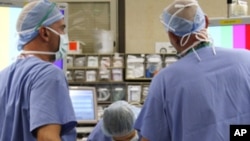Two new studies have found that gastric surgery can vastly improve or possibly reverse Type 2 diabetes, even in people whose condition is severe. The findings support the growing confidence among researchers that the most common form of the disease can be cured in the operating room.
Diabetes has reached epidemic proportions. According to the World Health Organization, 346 million people worldwide have diabetes. The number of deaths from complications of the disease is expected to double by 2030.
Diabetics, who have difficulty regulating their blood sugar, face a host of serious complications, including stroke, heart disease, kidney failure, blindness and limb amputations.
Given the urgency of the problem, researchers have turned to stomach or bariatric surgery for diabetic patients. In two studies published recently in the New England Journal of Medicine, researchers at Ohio's Cleveland Clinic report surgery that reduced the size of the stomach - typically performed to remove cancerous tumors or speed weight loss in the morbidly obese, also reversed diabetes in 40 percent of patients. Italian researchers, reporting on the results of a more radical gastric procedure, say 75 percent of diabetes patients in their study went into remission, while 95 percent were effectively cured.
The researchers note, however, that there are potentially serious complications from any bariatric surgery, including malnutrition.
The American Diabetes Association recommends that gastric surgery be reserved for obese patients who have failed to manage their disease with more conventional interventions, such as diet, exercise and medications.
Vivian Fonseca is head of medicine and science at the ADA and chief of endocrinology at Tulane University in New Orleans, Louisiana. In many cases, Fonseca notes, weight loss by itself can reverse diabetes, and that's why gastric surgery works so well. “The weight loss is substantial. It’s about 30 kilograms and you cannot get that weight loss with any lifestyle change or medical therapy and keep it persistent for a long period time," she said.
A number of less radical bariatric procedures, that don't remove part of the stomach, are being developed to aid Type 2 diabetics who are not obese.
Gastric surgeons at the University of Texas Health Science Center in Houston are recruiting normal-weight or thin diabetic patients for a study of a surgical procedure called ilial transposition.
Done though small incisions in the abdomen, the procedure reroutes the last part of the small intestines, called the ileum, and attaches it higher up to the second part of the small intestine, called the jejunum, just below the stomach.
The operation moves the ileum closer to the pancreas, the organ that makes the insulin we need to process sugar into energy. A digestive hormone in the transposed intestine stimulates the pancreas to secrete more insulin, so diabetics don't need to take it artifically. Ileum transposition also corrects insulin resistance in Type 2 diabetics, according to Erik Wilson, who performs bariatric surgery at the University of Texas Houston.
“So it’s not just about weight loss. We are re-altering the bowel in a way that the hormones work better in the body. And it’s resolving diabetes, and it’s resolving it much better than any medical therapy we have right now," he said.
Wilson says patients are frequently off their medications and their blood sugars have normalized before they leave the hospital in one to two days.
Research in the field is continuing and Wilson expects another ten to 15 types of surgical procedures will become available to treat or cure diabetics within the next two years.
News
Studies Show Gastric Surgery Can Reverse Type 2 Diabetes




